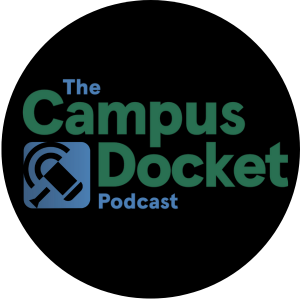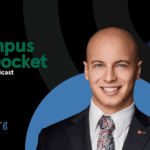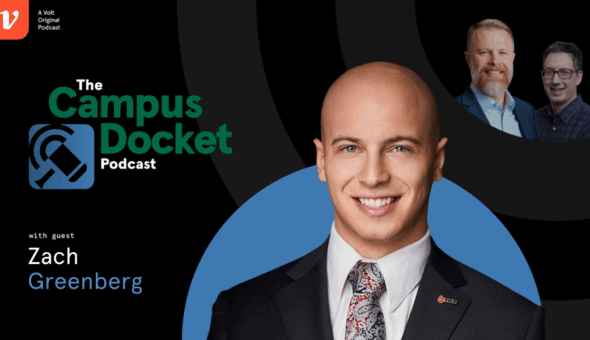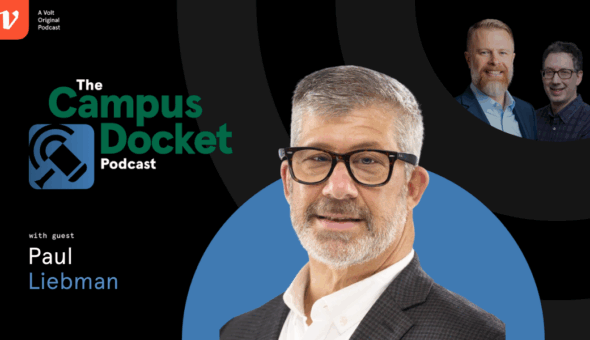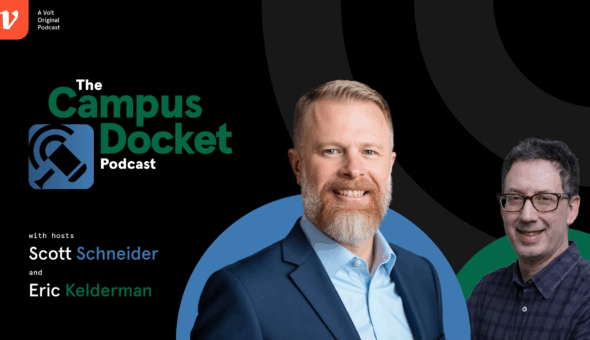The future of college sports is being legislated right now
College sports are at a legal and financial crossroads, and the path ahead is anything but clear. In this episode of Campus Docket, Gabe Feldman, a professor of law and associate provost for NCAA compliance at Tulane University, joins Scott Schneider and Eric Kelderman to break down where things stand and where it’s all headed.
The conversation dives into the legal issues surrounding NIL and the House settlement—an agreement that could fundamentally reshape how athletes are paid. Feldman explains how the culture of amateurism has long shielded college athletics from labor laws and antitrust scrutiny, but court rulings and changing public sentiment have started to tear it down. Feldman points out that the NCAA’s long-running claim that any change would “destroy college sports” has been used so often it’s wearing thin.
The discussion also takes a look at collective bargaining as a proposed solution. Feldman’s thoughts: it’s a nice theory, but it’s not that simple. Student-athletes haven’t shown much interest in unionizing, and public university constraints further complicate the picture. “Management can’t just declare a union into existence,” he says. “That’s not how labor law works.”
What happens if athletes are reclassified as employees? What if the compensation model mirrors pro sports? What does that mean for Title IX, Olympic sports, or schools already operating on thin margins? But the big question isn’t whether college sports will change—it’s how, and who gets to decide.
The Docket
- EEOC civil rights investigation into Harvard’s faculty hiring and promotion practices
- Cal Poly, DePaul and Haverford Head to Capitol Hill
- Title IX investigation of Western Carolina University by the U.S. Department of Education’s Office for Civil Rights
- O’Bannon v. NCAA (2014)
- The panel affirmed in part and reversed in part the district court’s judgment after a bench trial in an antitrust suit regarding the NCAA’s rules prohibiting student-athletes from being paid for the use of their names, images, and likenesses.
- Alston v. NCAA (2021)
- Supreme Court decision that challenged the NCAA’s compensation restrictions, particularly concerning education-related benefits, under antitrust laws. While the decision did not directly address broader compensation issues, it laid the groundwork for ongoing legal and policy developments in college athletics.
- House v. NCAA (ongoing)
- In May 2024, the NCAA and its five major conferences agreed to a $2.8 billion settlement, under which:
- Athletes who participated in NCAA Division I sports between 2016 and 2024 are eligible for compensation.
- Schools are permitted to pay athletes directly for their NIL rights, with a cap of approximately $20.5 million per school per year.
- Traditional scholarship limits are replaced with roster limits.
- As of June 2025, the settlement is pending final approval from U.S. District Judge Claudia Wilken. A recent extension has set the new deadline for final judgment to June 27, 2025, allowing time for potential appeals.
- In May 2024, the NCAA and its five major conferences agreed to a $2.8 billion settlement, under which:
- Johnson v. NCAA (ongoing)
- The Third Circuit held that college athletes might be employees under the FLSA if they perform services for another party, primarily for that party’s benefit, under that party’s control, and in return for compensation or in-kind benefits.
- The court also rejected the argument that the tradition of amateurism alone could bar athletes from asserting FLSA claims.
- The case was remanded for further proceedings consistent with this opinion.
- Additional Legal Concepts and Entities Referenced
- Title VII (prohibits employment discrimination based on race, color, religion, sex, and national origin)
- Title IX (prohibits sex-based discrimination in education programs and activities that receive federal funding)
- The Antitrust Laws
